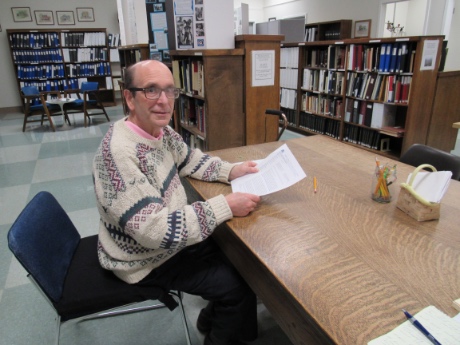
Above, Michael Eula, Ph.D., Genesee County historian, looks at a letter from the New York State Bar Association, inviting Genesee County to participate in the Historical Society of the New York Courts’ County Legal History Project.
Genesee County is among more than a dozen counties which have been invited by the New York State Bar Association to participate in the Historical Society of the New York Courts’ County Legal History Project.
The project entails documenting the law itself in each county and how it has changed through the years, said Genesee County Historian Michael Eula, Ph.D.
Eula received a letter April 1 from Leah Nowotarski, of Warsaw, a member of the Committee for Bar Leaders of New York State, requesting Genesee County’s participating in the history project. According to Nowotarski, a number of counties, including Clinton, Dutchess, Franklin, Rockland and Westchester, have already completed their histories, which are posted on the Historical Society of the New York Courts website.
Other counties which have also joined the project are Albany, Broome, Columbia, Essex, Franklin, Hamilton, Nassau, Ontario, Putnam, Queens, Rensselaer, Saratoga, Schenectady and Wyoming.
The history project is being led by Jonathan Lipmann, retired chief judge of the New York State Court of Appeals; Stephen P. Younger, past president of the New York State Bar Association; and Marilyn Marcus, executive director of the Historical Society of the New York Courts.
“This is an opportunity to showcase Genesee County’s rich and fascinating legal history, and how that legal history functions within the wider context of New York and national history,” Eula said. “Genesee County laws, and the courts that administer them, are examples of how the traditions are continuously being adjusted to the changes evident in the development of Genesee County’s history.”
Eula has chosen the title “Flexible Tradition: the History of the Courts in Genesee County, New York, 1802 to the Present” for his submission to the project.
While he has already begun research on the project, he anticipates it will take him a year to complete.
“Being county historian is not the only thing I do,” Eula said. “I am also the County Records Management Officer, so at best, I get to spend an hour and a half a day on the Legal History Project.”
Eula said he is happy Genesee County was included in the Historical Society of the New York Courts’ County Legal History Project.
“I’m going to look at courthouses we have had in Genesee County, their architecture and the famous cases which were held there,” Eula said. “I will also look at the law itself in Genesee County and how it has changed to keep up with a changing society.”
Eula said he has a whole archive of documents from the 1800s to search through. There is information on civil cases, criminal cases and much more, he said.
He will also explore how punishment has changed over time and how we define family law.
One of the most famous cases in Genesee County history is that of local businessman R. Newton Rowell, who walked into their bedroom and found his wife with her lover Johnson Lynch, the great-grandson of President John Adams. Rowell shot and killed Lynch, but the jury acquitted him.
“That is an example of how society and views have changed,” Eula said. “He probably wouldn’t have been acquitted today. I will also be looking at the law in terms of what is and isn’t acceptable behavior in Genesee County.”
Another interesting fact -- most people don’t realize we had slaves in Genesee County until New York abolished slavery in 1827.
“Even before then, as far back as 1813, slaves who were accused of a crime were given the right to a trial by jury,” Eula said.
The historian said it is interesting to note how a court itself is structured.
“You always have the judge on a platform, so we have to look up,” Eula said. “That tells us we are in a place of authority. Words used by lawyers in a courtroom, as time has gone on, have become almost like a foreign language.”
Eula will also explore how the legal world affects a typical resident of Genesee County, such as a hard-working farmer who is summoned as a juror. When he comes off the fields into a courtroom, it is a very different world from his normal one, Eula said.
Eula will also be submitting photos with his essay.
“I am very happy the Bar Association included Genesee County in its project,” Eula said.
Photo by Virginia Kropf.
